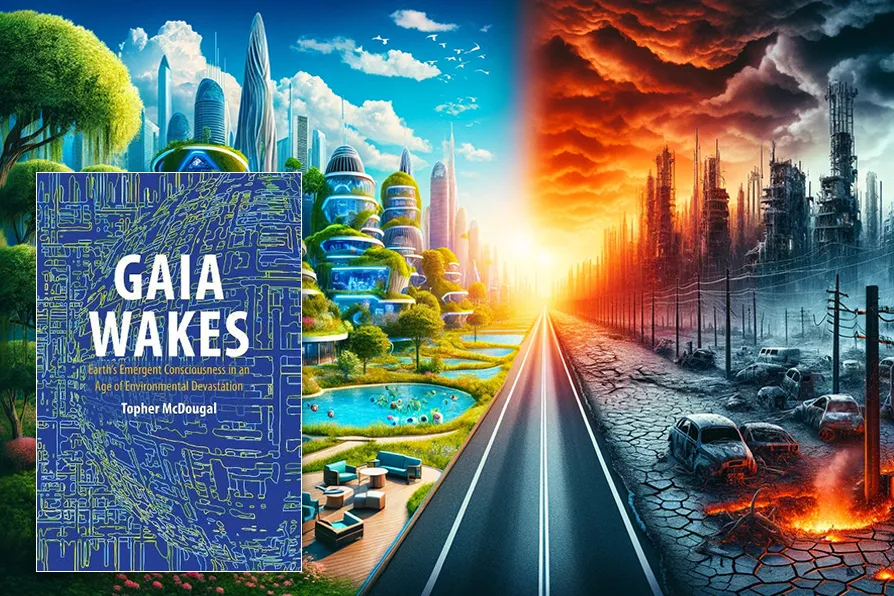CHRIS SEARLE speaks to Nicaraguan guitarist OMAR RIOS MELENDEZ
JOHN HAWKINS wrestles with the anti-humanist fantasies of techno-feudalist thinking

 An AI generated panoramic image vividly contrasting two futures, divided by a road. On the left, a vibrant futuristic utopia, showcasing harmony between advanced technology, with the right being a dystopian nuclear landscape [Pic:Mr vili/CC]
An AI generated panoramic image vividly contrasting two futures, divided by a road. On the left, a vibrant futuristic utopia, showcasing harmony between advanced technology, with the right being a dystopian nuclear landscape [Pic:Mr vili/CC]
Gaia Wakes: Earth’s Emergent Planetary Consciousness in an Age of Environmental Devastation
Topher McDougal, Agenda Publishing, £25
IT’s often said that Earth is the only known haven for life in the cosmos. And yet, paradoxically, we remain at war with it — consuming resources at a pace Bob Marley once described as eating up “all the flesh from off the Earth.”
In his striking new book Topher McDougal flips the Anthropocene narrative. His is not a story of how we will save the Earth, but how the Earth might awaken and save — or reject — us.
McDougal, an economist and professor of Economic Development and Peacebuilding at the University of San Diego’s Kroc School, brings together systems theory, AI speculation, mythic storytelling, and ecological science to propose that the Earth is not just a network of living systems, but an emergent consciousness — a planetary brain he names Gaiacephalos. In a world teetering on ecological collapse, McDougal suggests it may be this awakening intelligence, not human policy, that redirects the course of life on Earth.
Drawing on both Shakespeare’s The Tempest — with its themes of power, illusion and colonisation — and a Star Trek: The Next Generation episode called “Emergence,” McDougal invokes cultural analogies to frame what he sees as a tectonic philosophical shift. In the Star Trek episode, the Enterprise begins reconfiguring its own systems, bypassing human command to avert an unseen threat. Similarly, McDougal imagines Earth reconfiguring itself via the technosphere — fibre-optic cables, AI (including AGI), quantum computing and cities as neural nodes — into something with agency.
The metaphor of Spaceship Earth, made famous by thinkers like Buckminster Fuller and Kenneth Boulding, is central but ultimately transcended. While those theorists emphasised planetary limits in a closed system, McDougal takes a further leap: what if the ship has a mind of its own? What if Earth, like Stanislaw Lem’s Solaris, has begun to think — not metaphorically, but literally?
He writes: “The human race, like the crew of the USS Enterprise, finds itself aboard a vessel traversing the vastness of the Milky Way galaxy. But those thinkers were using the phrase only to evoke the limitations placed on human societies in a relatively closed, steady-state system.” By contrast, McDougal sees Earth’s interlinked information systems as forming an emergent neural network — evolving, sensing, and responding.
As for the human future, McDougall writes: “In developing the initial AI components of Gaiacephalos, humanity has begun a process that we ultimately cannot hope to control, although I believe that we may still hope to understand the larger logic at work and influence its trajectory positively.”
The book is deliberately structured like a brain, divided into two halves. The analytical first part lays out the mechanics of planetary emergence. The second part is speculative, imaginative and even mystical, exploring what a planetary mind might mean for humans, economies, and ethics.
In this bicameral design, Gaia Wakes strongly echoes British psychiatrist and neuroscientist Iain McGilchrist’s theory of divided hemispheric consciousness. Like McGilchrist’s The Master and His Emissary, McDougal’s Earth-mind is riven between synthetic, AI-driven “forebrain” functions, and human-mediated “hindbrain” processes tied to biology and ecosystem maintenance.
Yet McDougal diverges sharply from more traditional materialist critiques. While he acknowledges the insights of Thomas Piketty and references Marx’s post-labour utopia — “To hunt in the morning, fish in the afternoon, rear cattle in the evening, criticise after dinner” — he dismisses the Marxist claim that currency and price signals will become obsolete, calling such predictions “risible and retrograde.”
This marks a key departure: McDougal shares the eschatological horizon of Marxist ecological thinkers like John Bellamy Foster, who describes capitalism as producing an “ecological rift,” and Joel Kovel, who advocates for eco-socialism, but rejects their insistence on collective ownership and class struggle.
Instead, McDougal sees Earth’s salvation not in political revolution but in cybernetic evolution. Gaiacephalos is not a workers’ paradise — it is a distributed AI structure that conditions, co-ordinates, and perhaps one day overrides human action.
This techno-optimism risks replacing anthropocentrism with technocentrism. By placing trust in a planetary mind to regulate the chaos humans have unleashed, McDougal flirts with what critics might call technocratic mysticism. Gaiacephalos may be no less opaque or unaccountable than the capitalist ecologies it displaces.
Still, McDougal’s vision is undeniably compelling. His writing is by turns lyrical and mathematical, poetic and pragmatic. In an age where climate grief has become a dominant emotional state, Gaia Wakes offers neither nihilism nor naive hope. Rather, it charts a third path: Earth, it suggests, is no longer merely reacting — it may be awakening.
If so, what is our role? Not as sovereigns or victims, but as synapses — translators between biosphere and technosphere. In McDougal’s world, the future of life depends on how well we learn to interface with a consciousness that is at once alien and entirely of our own making.










